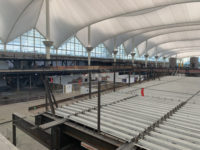Denver Airport Terminates P3 Contract For Main Terminal Renovation

Terminal renovations continue inside the Denver airport’s Great Hall in August, despite termination of the current construction contract.
PHOTO BY HELEN H. RICHARDSON/MEDIANEWS GROUP/THE DENVER POST VIA GETTY IMAGES
In a move that stunned transportation planners around the country, Denver International Airport terminated the contractor team working on a $650-million terminal renovation. The move also ended the airport’s $1.8-billion public-private partnership with Great Hall Partners, a consortium led by Ferrovial Airports, with partners Saunders/JLC Infrastructure.
The contractors released documents showing that the renovation, had GHP stayed on the job, would have cost more than $1 billion. That’s $288 million more than the contract, plus a $120-million contingency. Airport officials insist the project can be done for the original budget.
“This was not a decision arrived at lightly,” said DEN CEO Kim Day in an Aug. 13 news conference announcing the firing. “We are very far apart in cost and schedule and our values.” The termination is effective Nov. 12.
The decision also will cost the airport millions in termination fees and create substantial delays in completing the work. The project is only in the first of three phases, with most of the demolition done, after 13 months of work. The scope includes relocating TSA security positions to the north end of the terminal, consolidating unused ticket counters and adding more food and retail concessions, among other upgrades.
The two sides reached an impasse after months of squabbling. GHP cites multiple change orders, micromanagement by airport officials, and a delay to test concerns about existing weak concrete in the terminal (ENR 3/4-11 p. 5). After three months of testing last winter, the concrete was declared strong enough for construction to proceed. Meanwhile, airport officials allege multiple safety violations and contend that the contracting team was slow to respond to requests for information about cost and schedule. “GHP didn’t secure all of their permits, and we didn’t know how far behind on permits they were,” airport spokesperson Stacey Stegman told ENR. “So we said, ‘If this is happening now in phase one, what would phases two and three be like?’ ”
GHP, which has declined all requests for interviews, responded to the firing in a statement: “We are disappointed with DEN’s decision and strongly disagree with their characterizations of how we have arrived at this point. …The reality is that the project’s time and cost overruns are a direct result of the discovery of weak concrete in some areas of the terminal, which DEN did not disclose to GHP at the outset of the project, and more than 20 large-scale, badly timed and unnecessary change directives issued by DEN to the design they had previously approved.”
The P3 contract, the largest in Denver history, would have extended for 34 years, including four years of construction and 30 years of operations, with GHP building and paying for all improvements and managing the terminal’s concessions after completion. Revenue from concessions would have been split, with 20% going to GHP and 80% to DEN.
P3s Under Scrutiny
“This [contract termination] may launch a period of introspection among airport professionals,” says Robert Alfert, a partner with consultant Nelson Mullins. “It opens up a Pandora’s box. You will see a lot of re-evaluation all over the country where airport P3s are concerned.”
Some insiders fault a cumbersome contract—more than 15,000 pages long—and incompatible teams. “A P3 was not the right way to go from the beginning,” says a former airport employee, who requested anonymity. “In a P3, you need to get out of the way, and airport management insisted on being involved in every detail. Plus, GHP said they could complete the first phase in only 11 months. That was totally unrealistic.”
“It wasn’t the P3,” Stegman insists. “They just weren’t the right partner for us.”
Still, the airport says it plans to finish the project—now with an unspecified completion date—using traditional contracting methods and direct airport oversight, perhaps turning to firms already under contract to complete phase one next spring, and then use a procurement process for the remaining work. Officials say terminal project delays will not affect a concurrent $1.6-billion gate expansion project. The P3 exit negotiations could take months, and cost “a minimum of $200 million,” Stegman says. That price could go even higher, since the airport opted to terminate the contract for convenience, rather than cause, to help expedite the exit from the contract, officials say.




